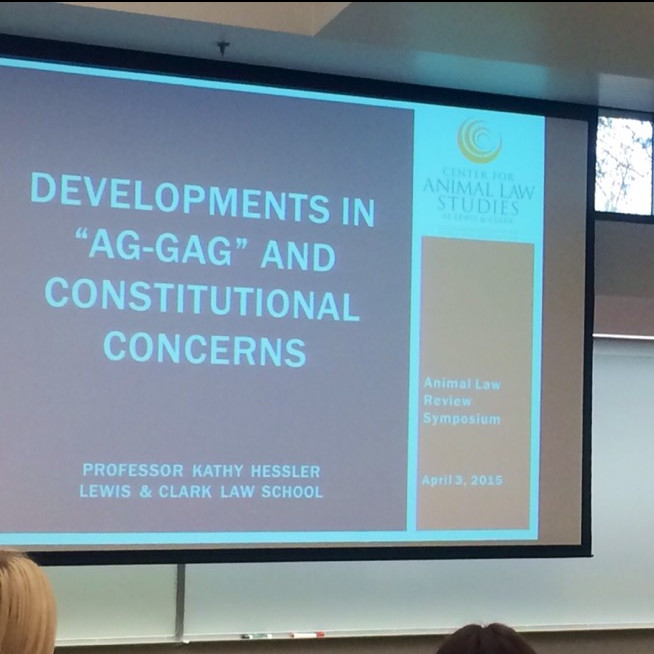Animal Law Symposium Calls Attention to Big Problems with Big-Ag
Open gallery

Friday, April 3rd, saw Lewis & Clark’s Animal Law Review host its 4th Annual Animal Law Review Symposium, entitled Old MacDonald’s Not-So-Little Farm: Navigating the Legal Landscape of Contemporary Animal Agriculture. Organized by the journal’s Submissions Editors, Kelsey Herman and Audrey Clungeon, the event represented ALR’s best-attended Symposium to date.
The Symposium’s topic reflected the significance of animal agricultural practices in the fields of animal and environmental law. Speaking to the growing focus on the animal agriculture industry, Ms. Herman, a third-year law student, observed that “more and more people are demonstrating concern and awareness about where their food comes from, so we knew that a Symposium on the law that applies to the current animal food production system would be of great interest to the animal law community. It’s a really important issue, as the sheer size of the industry means it has enormous impacts for not only animals, but humans and the environment as well. We also saw this topic as an opportunity to highlight the interdisciplinary nature of animal law, as the law surrounding animal agriculture overlaps with many other areas of law, including animal cruelty law, environmental law, constitutional law, labor law, and public health law.”
This diversity of legal issues was perfectly reflected by the Symposium’s panels and by its speakers.
Professor Kathy Hessler of L&C’s Center for Animal Law Studies set the tone for the day by bringing to light the constitutional concerns that arise out of Ag-Gag’s restrictions on First-Amendment rights. Turning the Symposium’s attention to the environmental impacts of industrial-scale animal agriculture, Carter Dillard, Director of Litigation for the Animal Legal Defense Fund, and Stephanie Feldstein, Director of Population and Sustainability at the Center for Biological Diversity, delved into the impact factory farming has on human consumption and population growth, while Elizabeth Holmes of the Center for Food Safety addressed the need to hold the industry accountable for its waste and contaminants.
The latter half of the Symposium focused on the treatment of the animals themselves. Paige Tomaselli, Senior Staff Attorney for the Center for Food Safety, and Peter Brandt, Senior Attorney at the Humane Society of the United States, discussed current legal challenges to ending the problematic use of pharmaceuticals on livestock. The Symposium’s final panel, comprised of Jacob Kamins, Oregon’s first full-time animal cruelty prosecutor, and Bruce Friedrich, the Director of Policy and Advocacy for Farm Sanctuary, delved into the overlapping interests in protecting the rights and well-being of animals, workers, and consumers.
Bringing a close to the event, Professor Hessler facilitated an open discussion among participants and attendees, who commented on the current state of animal agriculture legislation and shared strategies to cultivate much-needed, meaningful change.
More Center for Animal Law Studies Stories
Center for Animal Law Studies is located in Wood Hall on the Law Campus.
MSC: 51
email cals@lclark.edu
voice 503-768-6960
Center for Animal Law Studies
Lewis & Clark Law School
10101 S. Terwilliger Boulevard MSC 51
Portland OR 97219

